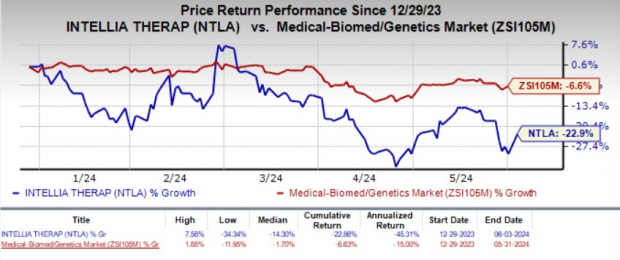Intellia Therapeutics' NTLA shares gained 10% on Jun 3 after the company reported encouraging long-term data from the phase I portion of its early to mid-stage study evaluating NTLA-2002 for treating hereditary angioedema. Shares of NTLA continued to gain another 1.1% in the after-market hours.
NTLA-2002 is Intellia's investigational single-dose CRISPR/Cas9 gene-editing therapy, which is being developed as a one-time cure for HAE. It is a rare genetic condition that is marked by severe inflammatory attacks in various body organs and tissues, which can be painful and even life-threatening. Despite the current treatment options that require chronic administration for disease control, HAE attacks still occur.
NTLA-2002 aims to prevent HAE attacks by suppressing the plasma kallikrein activity. Per the management, the long-term data presented at a recent medical conference has bolstered the candidate's potential as a groundbreaking treatment for HAE as patients experienced durable elimination of their attacks in the ongoing phase I/II study.
Year to date, shares of Intellia have plunged 22.9% compared with the industry's 6.6% decline.

Image Source: Zacks Investment Research
A total of 10 patients are being treated in the phase I portion of the study with either of the three one-time doses (25 mg, 50 mg, or 75 mg) of NTLA-2002,administered via intravenous infusion. Eight of these patients experienced no attacks during the initial 16-week observation period. These patients have experienced ongoing attack-free durations of greater than 18 months.
After the last assessment of HAE attacks as of Feb 12, 2024, a 98% mean reduction in monthly attack rate and a 99% mean reduction in moderate to severe attacks were observed after a single dose of NTLA-2002 in the overall patient population. Robust and sustainable reduction in HAE attack rate was observed upon treatment with all dose levels.
Intellia reported that the longest attack-free interval for an individual patient post-infusion is more than 26 months and ongoing. Treatment with NTLA-2002 has also shown a persistent reduction in HAE attacksin patients with the most severe HAE symptoms.
In the phase I/II study's beginning, two patients had the highest historic monthly HAE attack rates (16.8 and 14.0 attacks per month, respectively). Both patients were attack-free by the end of the 16-week primary observation period and have remained free of attacks through the latest follow-up.
Furthermore, Intellia reported that the longest attack-free duration among these two patients is 23.5 months and ongoing. All patients who discontinued prophylaxis treatment after NTLA-2002 remain free of chronic prophylaxis treatment.
At the time of the latest follow-up, the mean reduction in plasma kallikrein levels from baseline upon treatment with NTLA-2002 was 60% (25 mg, 88 weeks), 88% (50 mg, 72 weeks) and 95% (75 mg, 88 weeks).
Per Intellia, all three doses of the gene therapy candidate were well-tolerated in the phase I portion of the early to mid-stage study and most adverse events were mild in severity.
The company plans to assess HAE attacks and plasma kallikrein protein levelsthrough the remainder of the two-year follow-up period.
It has completed enrollment in the phase II portion of the study that will further evaluate the 25 mg and 50 mg doses of NTLA-2002 for HAE, expecting to report top-line data soon. Intellia also anticipates initiating a pivotal phase III study of the candidate for the same indication in the second half of 2024, subject to regulatory feedback.
Please note that the company's clinical-stage pipeline comprises another gene-editing candidate, NTLA-2001, which is currently being evaluated in a late-stage study in partnership with Regeneron to treat transthyretin amyloidosis with cardiomyopathy.
Zacks Rank and Stocks to Consider
Intellia currently carries a Zacks Rank #3 (Hold).
Some better-ranked stocks from the drug/biotech industry are ALX Oncology Holdings ALXO, Annovis Bio ANVS and Compugen CGEN, each carrying a Zacks Rank #2 (Buy) at present.
In the past 30 days, the Zacks Consensus Estimate for ALX Oncology's 2024 loss per share has narrowed from $3.33 to $2.89. During the same period, the consensus estimate for 2025 loss per share has narrowed from $2.85 to $2.73. Year to date, shares of ALXO have plunged 39.8%.
ALX Oncology beat estimates in two of the trailing four quarters and missed twice, delivering an average negative surprise of 8.83%.
In the past 30 days, the Zacks Consensus Estimate for Annovis' 2024 loss per share has narrowed from $2.93 to $2.46. During the same period, the consensus estimate for 2025 loss per share has narrowed from $2.83 to $1.95. Year to date, shares of ANVS have plunged 63.5%.
ANVS beat estimates in three of the trailing four quarters and missed once, delivering an average negative surprise of 1.39%.
In the past 30 days, the Zacks Consensus Estimate for Compugen's 2024 earnings per share has increased from 2 cents to 5 cents. The consensus estimate for 2025 loss per share is currently pegged at 11 cents. Year to date, shares of CGEN have gained 10.6%.
CGEN's earnings beat estimates in three of the trailing four quarters and missed once, delivering an average surprise of 5.79%.
© 2025 Benzinga.com. Benzinga does not provide investment advice. All rights reserved.
Trade confidently with insights and alerts from analyst ratings, free reports and breaking news that affects the stocks you care about.
